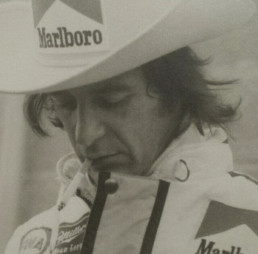Apart from a small parenthesis, I have never had a direct relationship with Lella Lombardi, although we participated in a few races together.
That is why I had little opportunity to get to know her, except occasionally in some races. She raced the Osella 2000-litre prototype. I knew Osella (mechanic) very well, as I helped him make a name for himself. In ’72 I won the European championship racing his cars and in ’73 I came second. So we were often in the same environment and I heard about her.
I didn’t have a close relationship of friendship or much confidence with her, who was always very reserved and friendly. Of course there was no lack of greetings, hugs and photos together as colleagues in the industry.
At the time, considering that she was a woman on the race track, she certainly did not go unnoticed. She was one of the few who stood out.
Women in the motorsport world were seen in a different light, and I can confirm this first-hand, because they did a job that was considered for male, tomboyish, only.
As a woman, she made people talk about her and she got noticed, but she was actually really good. A lot of people in those years tried, but there were very few who did as well as she did.
In the last 30 years there have been more women in the industry, but at the time it was a really closed sector. Furthermore, in those years, motor racing was the preserve of rich people and without money it was very difficult to get into the industry, afford the cars and participate in the races.
Lella is proof that, with strength and dedication, one can achieve important goals, despite prejudices, the difficulties of being a woman and having to manage money sparingly. She was a great driver!
To stand out in such a competitive environment as motor sport you needed the ‘right foot’, knowing how to push on the accelerator and reach the finish line. Those who were fast and talented in their own right knew how to stand out.
We were both present at the Spanish Grand Prix at the Montjuic circuit and, unlike Lella, I withdrew in protest at the poor safety conditions at the circuit, despite the fact that we had to honour our commitment to the organizers, to race and put on a show.
During the three qualifying laps, we decided to retire after the first lap.
Due to a serious accident, the grand prix was stopped and since the participants had only run 50% of the race plus one lap, the organizers decided to award only half of the points. Therefore, Lella Lombardi only got 1?2 point in Formula 1. Not because she was less good or because she was a woman, but it was the organizers’ decision for all drivers in the race. Lella was in fact the first woman to achieve this important milestone.

Later I took part in other races with Lella, such as the Grand Prix of the Mediterranean at the Pergusa racetrack (Enna), in Sicily, the European 2000-litre sport prototype championship as well as Formula 2.
We also participated together in the 1000km of Monza and I remember that I was racing with Ferrari at the time. These are just some of the races we both participated in, but it is difficult to remember them all after so many years.
Arturo Merzario is a former Italian racing driver, who raced in all disciplines from small touring cars to Formula 1, leading Alfa Romeo to victory in the 1975 Sport Prototype World Championship.


